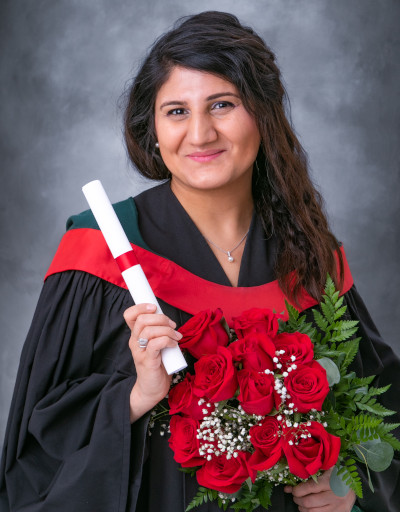Mona Abdolrazaghi takes the road less travelled
Ben Lof - 1 June 2023

While most students go from humanities or business into law, Mona Abdolrazaghi, ‘23 JD, took a more uncommon route, coming from an accomplished career in engineering.
This June, that path leads to her convocation from the University of Alberta Faculty of Law.
Despite little obvious overlap between the two fields, Abdolrazaghi’s first career provided a unique foundation for legal training.
“Engineering develops the ability to analyze complex systems by breaking them down into sub-components, whose behaviour and interaction with other components is easier to understand,” she says. “This is a valuable skill for understanding complex legislation or analyzing rulings in case law. Engineering also provides a solid knowledge base to understand the principles behind technology which affects society and raises new legal issues. For instance, autonomous cars and the issues of decision-making and liability, or blockchain technology used for cryptocurrency.”
Originally from Iran, Abdolrazaghi came to Canada to study mechanical engineering at the U of A. After obtaining her MSc, she worked in the oil and gas industry, most recently as a risk specialist for Enbridge Pipelines. Her gravitation toward law was shaped by seeing how integral lawyers are to the immigration process she and millions of Canadians have experienced. She also completed a graduate certificate of corporate finance at Harvard, which got her interested in the legal side of corporate transactions.
The Faculty of Law provided the flexibility for Abdolrazaghi to begin part-time while she worked as an engineer. She became a full-time student during a parental leave and then completed her remaining upper-year courses once back at work.
“I had amazing support from my mother and my husband, who took care of the kids while I studied,” she says, also remembering the late nights spent on coursework after her kids went to bed.
She also received generous support from both professors and staff throughout her studies.
“[Former] Vice Dean Eric Adams granted me permission to take additional courses in my second year when I was on parental leave. Professor Steven Penney provided invaluable feedback throughout my independent research paper course [the paper is forthcoming in The Manitoba Law Journal]. Professor Mitchell McInnes mentored me during another paper despite being on sabbatical leave.”
Among Abdolrazaghi’s highlights as a student in the Faculty of Law was a guest lecture by Justice Mahmud Jamal of the Supreme Court of Canada on the importance of preparation.
“He stressed that the more you write and review your work, the better you will be at advocacy,” she says.
Prioritizing empathy and fairness in law was also a hallmark throughout her courses.
“I remember many occasions where professors asked students whether the outcome of a decision was fair and why, versus just teaching the letter of the law.”
She also valued being part of ‘Boomer Study Buddies,’ a group of mature students formed during remote learning in the midst of the Covid-19 pandemic. “[It] made me feel less isolated during that challenging time, and we’ve kept in touch ever since.”
Another highlight was Professor Paul Paton’s Corporate Governance class, where Abdolrazaghi wrote a paper on increasing corporate diversity, which she recently published in CBA National (she has also published there previously).
“I have become increasingly convinced that diversity by itself does not lead to improved corporate performance, and may lead to ‘diversity washing’ where minorities are hired primarily to improve the diversity statistics. Instead, I believe we should broaden the concept to mean the diversity of viewpoints, skillsets, and perspectives. Further, companies and firms need to provide mentorship and internship opportunities for such people to be able to demonstrate their full potential.”
Abdolrazaghi’s own journey continues in June, when she begins articling at Enbridge Legal Services in Edmonton, with a secondment at Dentons.